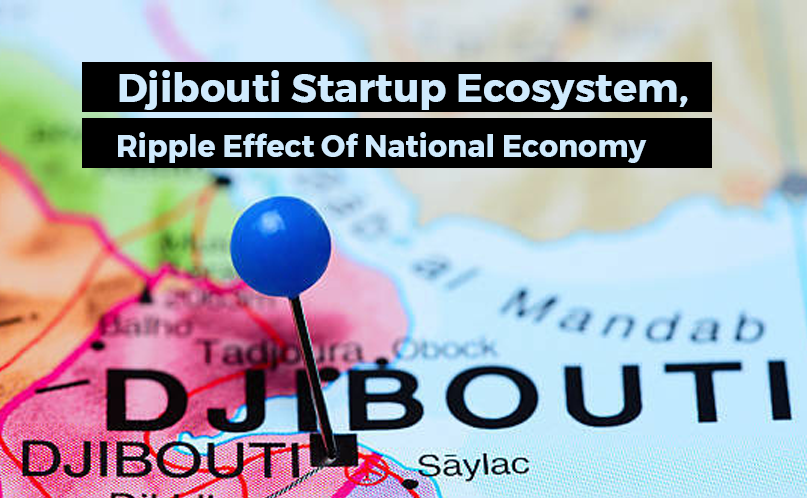Djibouti Startup Ecosystem, Ripple Effect Of National Economy

Djibouti’s economy is one of the smallest economies in the Middle East and North Africa region (MENA). It is situated in the Gulf of the Red sea which accounts for most of its major growth. With a largely unskilled labour force and minimal natural resources, the country’s economic climate is described as harsh. Due to this, Djibouti operates a large service sector which ranges from transportation, and international shipping to vessel refuelling.
Since its civil war in the 1990s, the country has recorded some economic improvement. However, Djibouti is still saddled with many economic challenges such as job creation, unemployment and poverty. In 2020, it was ranked 112th among 190 economies in business.
In 2022, According to the World Bank, the Djibouitian GDP growth rate slowed down to 3.6 per cent after scaling up to 4.8 per cent in 2021 after the global pandemic. Although the financial authority predicts a growth of 5.3 per cent in the nation’s GDP during 2023 and a possible 6.2 per cent by 2024
Djibouti And The Startup Ecosystem
The startup ecosystem in Djibouti is one of the smallest yet thriving tech ecosystems on the continent. It has a population of about one million. Due to its economy, the country is perfect for startups as its easier to attract investors and raise funding. Its unique geographical location creates easier access for startups to the global market.
Djibouti is currently capitalizing on the startup ecosystem to rebuild its economy and pay off its debts. It is mainly focused on developing strategic solutions to the country’s problems by creating new technologies, improving business processes and creating better experiences for customers. In 2013, the startup ecosystem raised a total of $2.5 million in funds.
Djiboutian Startups
This is one of the major startups in Djibouti. The startup is dedicated to improving Africa’s green future and expanding the global renewable energy sector. This is done by creating and retailing eco-friendly products that enhance operational performance and reduces costs of energy consumption and its negative impact on the environment.
In 2018, the company raised a total funding of $25000. In 2022, the founder, Mr Kahsay officially signed and announced the cooperation agreement between the company and LETIN AUTO to introduce a low-carbon mobility system to the nation.
The Djiboutian government is slowly incorporating this movement into the system and creating other green governmental programs in a bid to completely transition to a 100% renewable energy sector. The country is also aiming to reduce its carbon emissions to 40% by 2030.
Just as most nations have e-commerce startups, Djibouti is not left behind. Based on research, Toukam is the biggest e-commerce platform in the MENA nation. Founded in 2017, the startup provides a platform for Djiboutian retail merchants to showcase and sell their merchandise. This ranges from electronics, household items, fashion wear for men and women and many more. Users of the platform in form of buyers are given the avenue to place orders of desired goods from the comfort of their homes and have them delivered to their doorstep.
Leveraging the startup’s platform, many Djiboutian traders gain access to various customers from various aspects of the country. This initiative, therefore, enhances job creation and entrepreneurship within the nation.
The platform is recognized for its mission to create a stable link between consumers and retailers through tech. Toukam is also enhancing and expanding the mode of commerce in the country.
While Toukam’s platform is quite active, the startup is yet to reveal if it had raised any fund rounds since its inception. Neither has it provided information about the number of merchants it has onboarded.
Djibouti also offers a good range of options to raise funding as a startup. Many national banks are eager to invest in startups and provide resources to the startups. Startup founders also raise funding through angel investors and venture capitalists. Some governmental agencies and funds aid indigenous startups in raising capital and expanding, such as The Djiboutian Startup Investment Authority (ASIA), The Djiboutian Chamber of Commerce and Industry (CDCI), and The Djiboutian Startup Fund (DFS).
Although the government recognises the importance of startup growth and investments to the nation’s economy, there are still many policies preventing the expansion of startups in the nation. This has resulted in many investors diverting their funds to other countries with better laws and regulations.
Another major limitation to the expansion of the startup ecosystem is the lack of accessibility of these innovations to its citizens. Over 75% of the Djibouti population is presently living below the world poverty line and as such, there is a high level of illiteracy among its citizens. The problem of Illiteracy is also a result of disparity as the nation is majorly a french speaking country.
Many startup founders might be concerned about the low internet penetration of 10 per cent in the country as this prevents them from operating and smoothly running their services. This is evident as there is only a few media representation of the nation’s startups. Especially via online media outlets and social media platforms. For startups, Internet access is not a luxury, it is a necessity. Low internet penetration has the tendency to create ripple effects on startup activities and an economic impact at large. Understanding the impact of digital and internet penetration, the government set up the new Digital Foundations Project. The project is meant to provide citizens with affordable internet. According to the nation’s press release published on the World Bank Editorial platform, it reads ” The new Digital Foundations Project aims to ensure that more citizens and businesses have access to quality and affordable internet by developing an enabling environment for the gradual introduction of competition and private-sector investment in information and communication technology (ICT), and by fostering the uptake of digital skills and services. The project is aligned with the new Country Partnership Framework and Djibouti’s Vision 2035, which recognize the role of ICT in economic growth.”
The startup ecosystem in Djibouti is less competitive which provides a great avenue for growth and development. There is also a need for the government to revisit and revise its policies such as the lack of any bilateral investment treaty (BIT) which will open them up to more markets and create a better avenue for business that will attract investors and boost the growth of startups in the country.
